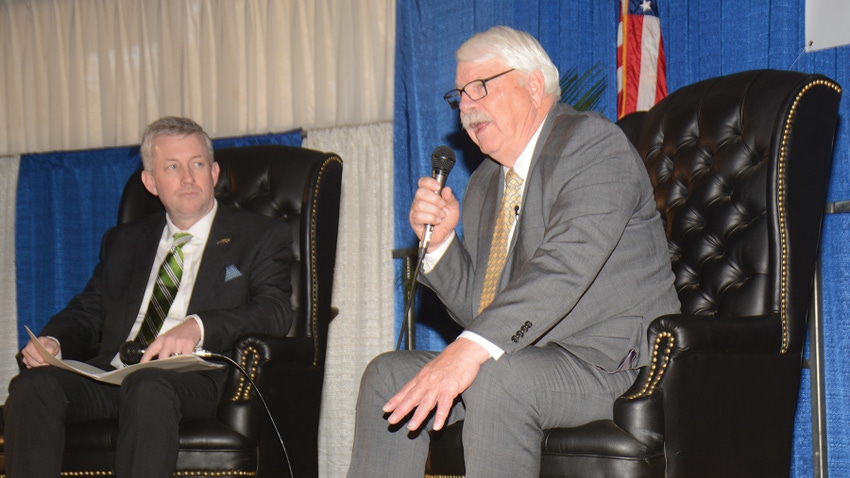
North Carolina Agriculture Commissioner Steve Troxler continues to sound the alarm on the vital need for farmland preservation in the rapidly growing Tar Heel State. Farmland preservation was a focus of the commissioner’s 2024 State of Agriculture address at the annual Ag Development Forum at the Southern Farm Show in Raleigh Feb. 1.
“When I came into office, I had farmed in the shadow of Greensboro basically all my life, so I know what urban encroachment looks like. In a lot of cases, the farm would run right up to the yard of a person that was in a subdivision, so I had an understanding of that,” Troxler said.
Troxler said North Carolina ranks No. 3 in people moving in from other states. He said Raleigh is the No. 2 fastest growing city in the country while Charlotte is No. 6.
Farmland preservation
Troxler said that since he came into office, his priority has been a robust farmland preservation program in North Carolina. To date, 34,000 acres of farmland has been protected through permanent conservation easements, but Troxler warned the state faces risks of losing from 1.1 million to 1.9 million acres to development. He said North Carolina currently has roughly 8.3 million acres of farmland, so that potential loss of land could be significant.
The commissioner stressed that farmland preservation goes beyond just protecting farms.
“It’s farms that we are protecting, but a farm is so much more than just what you think of producing the food. We actually in farms and forestry in North Carolina sequester 26% of all the carbon emissions that the state puts out. Every time we take a farm away or a forest away, we have changed that climate balance of sequestering CO2,” he said.
Moreover, Troxler said farmland preservation is vital for providing open space and wildlife habitat. “It’s a place where water percolates into the ground instead of running off and causing flooding. Protecting farmland is paramount to all these issues. Protecting one farm you get so many different things that are good for North Carolina.”
More funds needed
Troxler said the North Carolina Legislature allocated $25 million in the past legislative session, but more funding is needed.
“When I look at some of the things that other states have had to do to protect it, that’s not nearly enough money. New York found out that New York City was not going to have good water quality if they didn’t protect the farmland in northern New York State. They spent over $250 million in protecting farms up there,” Troxler said.
“You look at these states that have these really robust programs to protect farmland, the reason being they already lost most of it. We’ve got to be smarter than that in North Carolina. We’ve got to get ahead of the curve and make sure this $103 billion industry continues to grow and thrive.”
Troxler’s 2024 State of North Carolina address switched to a different format from previous addresses, with Sandy Stewart, president of Sandhills Community College in Pinehurst asking the commissioner questions, rather than Troxler giving a speech. Stewart was named president of Sandhills Community College in July 2023, after serving as assistant commissioner of agricultural services at the North Carolina Department of Agriculture and Consumer Services since 2018.
About the Author(s)
You May Also Like






